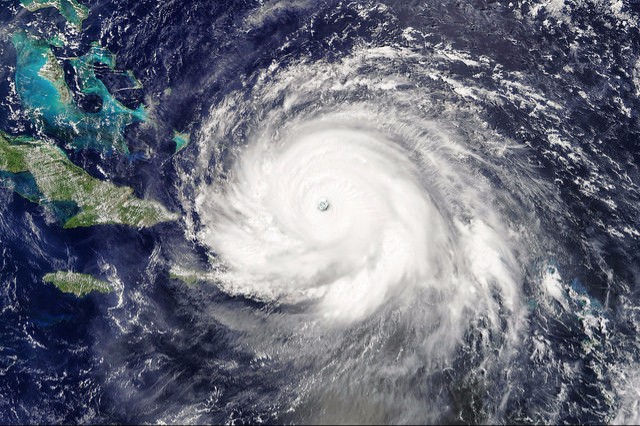“XX-34 BADGER” atmospheric nuclear test – April 1953 | CTBTO, CC BY 2.0
Sorry guys, it’s not a good news week. We’ve got stories on North Korea building a hydrogen bomb, climate change making hurricanes and wildfires worse while American politicians scream about how now is “not the time” to talk about climate change, and a hack so big that nearly one in two people with an American credit history are affected. It’s the apocalyptic news roundup for Sunday, September 10, 2017.
North Korea’s H-Bomb
It’s been an apocalyptic sort of week. Setting aside the havoc being wrought by climate change (more on that in a minute), we also have the 1984-was-a-manual style dictatorship known as North Korea (the self-styled “democratic” people’s republic of) setting off what it claims was a hydrogen bomb. There was some contention earlier in the week as to whether it really was an “H-bomb” or just an enhanced “A-bomb,” but now sources in the US intelligence community are reportedly saying it’s “highly likely” they’re telling the truth. At 140 kilotons, it’s no Tsar Bomba, but that still makes it ten times more powerful than the bombs dropped on Hiroshima and Nagasaki. The difference is in the way the bomb produces its power: a traditional atomic bomb, or a nuclear weapon, is a fission bomb, creating a chain reaction of splitting atoms. A hydrogen bomb is a thermonuclear weapon, a fusion bomb whose energy comes from combining hydrogen atoms. Essentially, you take a fission bomb, stick it into a container with a bunch of fusionable materials (like deuterium or tritium), and the force of the nuclear explosion compresses the fusionable material until fusion takes place. This gets you a much bigger bang, as it were. And this is what probably happened this week in North Korea. It’s unclear to me whether anyone there would be misguided enough to try to use one on a missile, and there’s debate among experts as to whether they might ever try a combined warhead/missile test (pro-tip: don’t tell them they can’t do it, that’s how we got China proving they could), but the fact of the matter remains that at this point North Korea is a nuclear-armed state and nobody’s really sure what to do about it. You can read more analysis over at 38 North.

Apocalypse Now? How About Now? Or Now?
If you thought Harvey was bad, can I interest you in Irma? Or maybe Jose? At the time I’m writing this (Saturday afternoon), Hurricane Irma is a category three hurricane with sustained winds of over 125 miles per hour. It’s already done incredible damage to Barbuda and Saint Martin, wrought havoc in Puerto Rico, and now it’s beating the hell out of Cuba on its way to the Florida Keys and (again, at best estimates right now) the west coast of Florida. And if that weren’t bad enough, category four hurricane Jose is coming in from the Atlantic to deal another blow to the easternmost islands again, before sweeping north toward Bermuda. And if wind and water aren’t your thing, can I interest you in the nearly four million acres in the US and Canadian west that are or have recently been on fire? Both of these things—the intensity of the hurricanes lashing the Atlantic and Gulf coasts, and the burning of the west—are certainly made worse by climate change. There’s a heatwave in the west that’s an extra 3 degrees Fahrenheit warmer than it should be because of human-caused warming. As much as 30% of the water dumped on Houston was attributable to climate change. And all the science deniers in the government can do is claim we’re playing politics by pointing it out.
No, guys, we’re pointing it out because the first step to fixing a problem is to admit you have it. Here’s the evidence. Now do something. As the inimitable Phil Plait put it: Now is exactly the time we should be talking about Climate Change. Before there isn’t a later to talk about it.

Equifax Hack
So much of what we are able to do in this country relies on an individualized and obscurely-derived number called your credit score. A few large companies track everything you do financially, and then decide whether anyone else in the country ought to lend you money, give you a credit card, let you buy a house or a car, go to school, start a business, or basically anything that requires the investment of capital. And now one of the biggest ones, Equifax, has been hacked, to the tune of the records of 143 million Americans. That’s almost half of America whose records could be used to impersonate them, while ruining those magic numbers and therefore their ability to do some of the most important things in American society for moving up the increasingly slippery social ladder. And to make matters worse, they’re being massive dickheads about it, too. The reports are now surfacing that the company’s online tool doesn’t actually tell you if your information has been stolen, and the “free” service it signs you up for starts charging you a year out—oh, and it also has fine print that takes away your right to sue them. There’s been some scrambling on the part of the company to clear things up, but it’s not looking great. CNET (among others) is offering advice for if you’ve been affected, and what to do about it. Here’s another useful explainer from the New York Times. Good luck to us all.
Best of the Rest
So at least there’s a little good news in the linkspam this week. That’s good. Right? Right?
- Scientists think they can kill two birds with one stone, lowering chances of a supervolcano erupting and generating power
- Someone’s come up with a new way to see where an endoscopic camera has travelled to in your body
- Elon Musk and Voldemort Putin have opinions about AI
- Scientsists used the zika virus to kill brain cancer in mice
- There was a big solar storm this week, which basically just meant a great light show
- Mario lost his job as a plumber, and
- Elle wrote us a great piece for Feminist Friday this week about diversity, L’Oreal, and Munroe Bergdorf.
That’s all for today. Have a great week.
***
Thanks again for reading. Except for the very *very* occasional tip, we only get paid in my own (and your) enthusiasm, so please like This Week In Tomorrow on Facebook, follow us on Twitter @TWITomorrow, and tell your friends about the site!
If you like our posts and want to support our site, please share it with others, on Facebook, Twitter, Reddit — anywhere you think people might want to read what we’ve written. If there’s something you think we’ve missed or a story you’d like to see covered, drop us a line! Thanks so much for reading, and have a great week.
***
Richard Ford Burley is a human, writer, and doctoral candidate at Boston College, as well as Deputy Managing Editor at Ledger, the first academic journal devoted to Bitcoin and other cryptocurrencies. In his spare time he writes about science, skepticism, feminism, and futurism here at This Week In Tomorrow.

